
Maharishi's Programmes
Scientific Research Studies
Skill in management demands full alertness, full creativity, and full support of Nature. Scientific research on Maharishi's Transcendental Meditation and extensive experience in corporations around the world amply document the growth of these key success factors and other benefits for managers, employees, their families, and their social environment.
Broad Comprehension and
Increased Ability to Focus
Perceptual and Motor Skills
Field independence has been associated with a greater ability to assimilate and structure experience, greater organization of mind and cognitive clarity, improved memory, greater creative expression, and a stable internal frame of reference. The results show that practice of the Transcendental Meditation technique develops greater field independence. This improvement in Transcendental Meditation meditators is remarkable because it was previously thought that these basic perceptual abilities do not improve beyond early adulthood. (Perceptual and Motor Skills 39: 1031–1034, 1974. Perceptual and Motor Skills 62: 731–738, 1986.)
Increased Creativity
Journal of Creative Behavior
It is widely recognised that creativity and innovation are key success factors in today's competitive business environment. The Transcendental Meditation program significantly increases creativity, as shown by this study using the Torrance Tests of Creative Thinking. Five months after learning the Transcendental Meditation technique, individuals practising the TM technique scored significantly higher than members of a control group on three dimensions of creative thinking. Other studies have shown that the TM program alleviates the stress and anxiety that can obstruct creativity while making the functioning of the brain more orderly (as measured by EEG coherence), which has been positively correlated with creativity. (Journal of Creative Behavior 13: 169-190, 1979. )
Reduced Stress and Anxiety
Journal of Clinical Psychology
A statistical meta-analysis conducted at Stanford University of all available studies -- 146 independent outcomes -- found that the Transcendental Meditation program was substantially more effective in reducing anxiety, the most common sign of psychological stress, than all other meditation and relaxation techniques, including muscle relaxation. This meta-analysis -- the preferred scientific procedure for drawing definitive conclusions from large bodies of research -- showed that the positive effects of the TM program could not be attributed to subject expectations, experimenter bias, or quality of research design. (Journal of Clinical Psychology 45: 957-974, 1989.)
Reduced Risk Factors for Heart Disease
Hypertension and
Psychosomatic Medicine
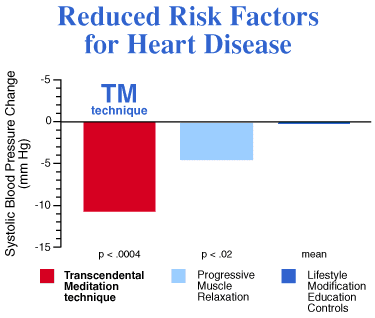
The Transcendental Meditation program has been shown to significantly reduce risk factors for heart disease, including hypertension, high cholesterol, anxiety, hostility, and smoking. In a randomised study published in the journal of the American Heart Association, individuals with mild hypertension experienced significant reductions in systolic and diastolic blood pressure over a 3-month period after learning the TM technique. These reductions in blood pressure were substantially greater than those experienced by individuals in two control groups -- a 'usual-care' group that received training in improved diet and exercise and a group practising muscle relaxation. The TM technique produced reductions in blood pressure equivalent to those produced by anti-hypertensive drugs but without their adverse side effects. A related study of health insurance data over a five-year period found that individuals regularly practising the TM technique required 87% less hospitalisation for heart disease than the norm. (Hypertension, 26: 820-827, 1995. Psychosomatic Medicine 49: 493-507, 1987.)
50% Less Need for Medical Care
Psychosomatic Medicine
A study of medical care utilisation statistics for 2000 people throughout the U.S. who regularly practised the Transcendental Meditation technique found that over a 5-year period they consistently had 50% fewer doctor visits and hospital admissions than other groups of comparable age, gender, profession, and insurance terms. Their overall rate of hospitalisation was 56% lower than the norm, and hospital admissions for those over 40 years of age were 69% lower. Individuals practising the TM technique had fewer hospital admissions in all disease categories compared to the norm, including 87% less hospitalisation for heart disease, 55% less for cancer, and 87% less for diseases of the nervous system. (Psychosomatic Medicine 49: 493-507, 1987. )
Reversal of the Ageing Process
International Journal of Neuroscience
This study examined the effect of the Transcendental Meditation program on the 'biological age' of a person -- how old a person is physiologically in contrast to chronologically. As a group, long-term TM program participants, who had been practising the TM technique for more than 5 years, were physiologically 12 years younger than their chronological age, as measured by lower blood pressure, better near-point vision, and better auditory discrimination. Short-term TM program participants were physiologically 5 years younger than their chronological age. The study statistically controlled for the effects of diet and exercise. (International Journal of Neuroscience 16: 53-58, 1982.)
Reduced Smoking, Drug and Alcohol Use
Alcoholism Treatment Quarterly and
International Journal of Addictions
A statistical meta-analysis of 198 independent treatment outcomes found that the Transcendental Meditation program produced a significantly larger reduction in tobacco, alcohol, and illicit drug use than standard substance abuse treatments and prevention programs. The meta-analysis controlled for strength of study design and included both heavy and casual users. Whereas the effects of conventional programs typically fall off rapidly within 3 months, effects of the TM program increase over time. Total abstinence from tobacco, alcohol, and non-prescribed drugs ranged from 51% to 89% over an 18-22 month period. The effects of the TM program are based upon fundamental and naturally occurring improvements in mind and body. (Alcoholism Treatment Quarterly 11: 13-87, 1994; International Journal of Addictions 26: 293-325, 1991).